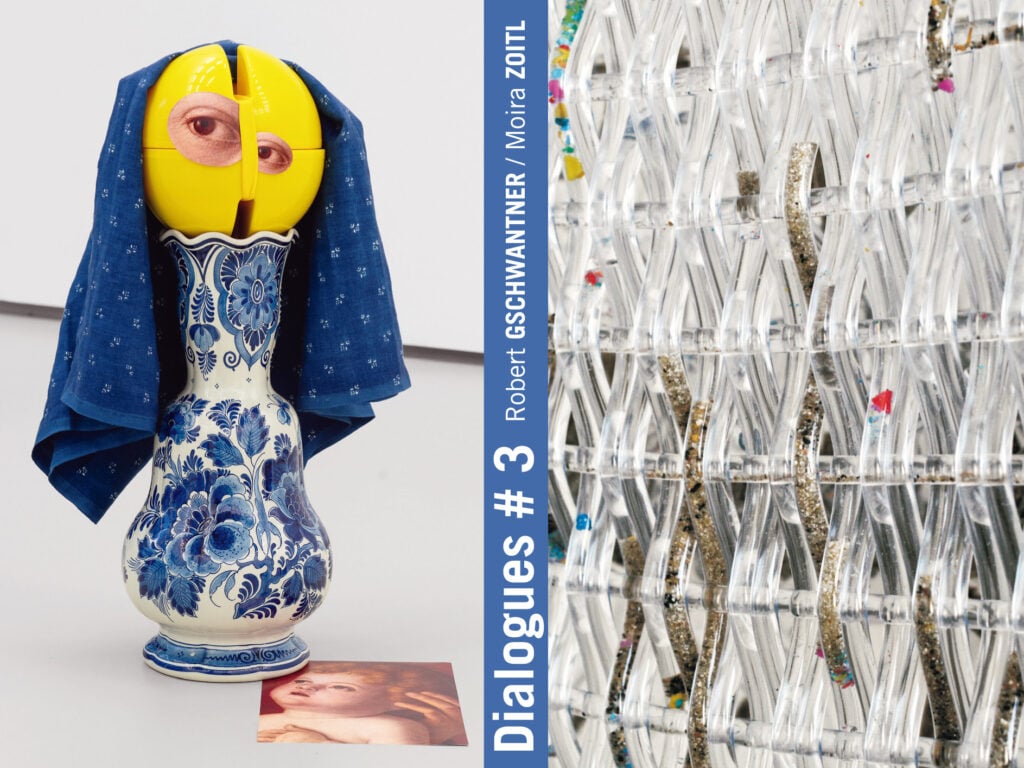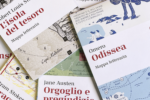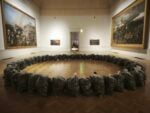Dialogues #3 – Robert Gschwantner / Moira Zoitl

Nella mostra Dialogues #3 – Floating Debris, Robert Gschwantner (Steyr, Austria, 1968) e Moira Zoitl (Salzburg, Austria, 1968) dialogano sul mare come via di trasporto di persone, merci e tecnologie, e sugli effetti che ne conseguono dal suo sfruttamento intensivo ormai millenario.
Comunicato stampa
Nella mostra Dialogues #3 - Floating Debris, Robert Gschwantner (Steyr, Austria, 1968) e Moira Zoitl (Salzburg, Austria, 1968) dialogano sul mare come via di trasporto di persone, merci e tecnologie, e sugli effetti che ne conseguono dal suo sfruttamento intensivo ormai millenario. Il mare sta diventando sempre più un contenitore di resti e rifiuti antropici che formano vere e proprie isole galleggianti o vengono rinvenuti drammaticamente sulle coste e sulle spiagge di tutti i continenti.
Colonizzazione, industrializzazione e successivi effetti della produzione globale di massa sono le principali tematiche della mostra, che Moira Zoitl e Robert Gschwantner sviluppano in un dialogo che prende spunto dalla diffusione via mare della tecnica blueprinting che è cominciata con la secolare importazione di colore indaco dalle indie. Uno sguardo agli inizi della produzione industriale, alla colonizzazione e allo sfruttamento dei paesi in via di sviluppo con conseguente l'importazione massiva di materie prime che ci proietta rapidamente all'odierna produzione massiva e globale di ogni tipo di merce, ci vuole evidenziare che il profitto è limitato a pochi, ma gli effetti riguardano l'intera umanità, tutti gli esseri viventi ed i nostri habitat.
Moira Zoitl condensa la storia migratoria di beni e tecniche nell'installazione Azure Relation (2018-2023) e in alcune sculture realizzate con oggetti diversi, materiali di riuso: vasi blu e bianchi provenienti dai Paesi Bassi, tessuti con stampe blu dall'Austria, dall'Ungheria e dalla Baviera, passamanerie, corde, oggetti vari, ecc.
Lo sguardo ed il contributo di Robert Gschwantner è altresì rivolto alle conseguenze drammatiche dell'oggi e della nostra realtà industriale globale. Nel 2020 ha raccolto particelle di plastica, sabbia e acqua di mare da una spiaggia della piccola isola greca di Yalis. Ha iniettato questi reperti - come da sua pratica artistica consueta - nei tubicini in PVC di tappeti intrecciati a mano, cui l'acqua di mare ha conferito un aspetto simile al vetro.
In the exhibition Dialogues #3 - Floating debris, Robert Gschwantner (Steyr, Austria, 1968) and Moira Zoitl (Salzburg, Austria, 1968) converse about the sea as a transportation route for people, goods, and technologies, and the effects resulting from its intensive use over thousands of years. The sea is increasingly becoming a container for anthropogenic remains and wastes that form veritable floating islands or are dramatically found on the coasts and beaches of all continents.
Colonization, industrialization and the subsequent effects of global mass production are the main themes of the exhibition, which Moira Zoitl and Robert Gschwantner develop in a dialogue that takes its cue from the migration across the sea of the blueprinting technique that began with the centuries-old import of indigo color from the Indies. A look back at the beginnings of industrial production, the colonization and exploitation of developing countries resulting in the massive importation of raw materials that quickly propels us to today's massive and global production of all kinds of commodities, is meant to highlight to us that profit is limited to a few, but the effects affect all of humanity, all living things and our habitats.
Moira Zoitl condenses the migratory history of goods and techniques in the installation Azure Relation (2018-2023) and a number of sculptures made from different objects, ready-made materials: blue and white vases from the Netherlands, blue-printed textiles from Austria, Hungary and Bavaria, trimmings, ropes, flotsam and jetsam...
Robert Gschwantner's gaze and contribution is also directed at the dramatic consequences of today and our global industrial reality. In 2020 he collected plastic particles, sand and seawater from a beach on the small Greek island of Yalis. He injected these findings-as per his usual artistic practice-into the PVC tubes of hand-woven carpets, which were given a glass-like appearance by the seawater.



